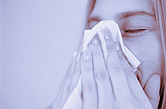- 10 Strategies to Overcome Insomnia
- Could Artificial Sweeteners Be Aging the Brain Faster?
- Techniques for Soothing Your Nervous System
- Does the Water in Your House Smell Funny? Here’s Why
- Can a Daily Dose of Apple Cider Vinegar Actually Aid Weight Loss?
- 6 Health Beverages That Can Actually Spike Your Blood Sugar
- Treatment Options for Social Anxiety Disorder
- Understanding the Connection Between Anxiety and Depression
- How Daily Prunes Can Influence Cholesterol and Inflammation
- When to Take B12 for Better Absorption and Energy
Too Little Sleep May Quadruple Your Risk for Colds: Study


When you’re run down from lack of sleep, you really are more apt to catch a cold, a new study finds.
Investigators exposed 164 adults to a cold virus, and found better-rested folks more likely to resist infection.
Those who slept fewer than six hours a night were more than four times as likely to catch a cold as those who got more than seven hours’ shuteye.
“The role that sleep has on the immune system is well-established, though not completely understood,” said study lead author Aric Prather, an assistant professor of psychiatry at the University of California, San Francisco.
The study doesn’t prove that insufficient sleep actually causes you to catch a cold. But it builds on prior investigations that have linked bad sleep habits to a weakened immune system and a potentially higher risk for developing an array of chronic illnesses.
Prather noted that animal and patient investigations have shown that “when an otherwise healthy person is (temporarily) deprived of an entire night of sleep, we see fairly robust changes in things like which types of immune cells are circulating in the blood and what types of chemical messengers are released from cells that aid in immune system communication.”
The U.S. Centers for Disease Control and Prevention has expressed concern about an “epidemic” of insufficient sleep, the study authors noted. They also point to a recent National Sleep Foundation survey indicating that, on average, 20 percent of Americans get less than six hours of sleep a day.
Participants in this study were healthy Pittsburgh residents ages 18 to 55. All took part in a two-month health screening process between 2007 and 2011.
In the week leading up to their exposure to the cold virus, researchers monitored participants’ usual sleep patterns. Afterward, all were quarantined in a hotel for five days and given nasal drops containing a cold virus.
The result: Cold risk was 4.2 times greater for those who slept fewer than six hours a night, and 4.5 times greater for anyone grabbing five hours or less of slumber a night, when compared with those getting more than seven hours a night.
The findings held up even after accounting for factors such as time of year, weight and obesity status, income, education background, self-declared stress levels, smoking status, exercise routines and drinking habits, the researchers said.
They added that their findings, published in the September issue of Sleep, are based on strong science, given that they tracked existing bedtime patterns, rather than artificially withheld sleep.
Mary Carskadon, a professor of psychiatry and human behavior with Brown University Alpert Medical School in Providence, R.I., expressed little surprise with the findings.
“This is a confirmatory study of other studies that have been moving our thinking in this direction,” she said. “Short sleep has been linked to a greater risk for cancer and other more chronic conditions, and consistently shorter sleep has clearly been associated with a higher likelihood of illness.”
However, no study to date “has yet spoken to the mechanism behind this,” said Carskadon, who is also a sleep researcher at E.P. Bradley Hospital in East Providence, R.I.
“So even though we know good sleep is part of a healthy lifestyle, we don’t know if it’s actually protective,” she added. “In other words, is longer sleep protective or is shorter sleep just exposing vulnerabilities? It’s a chicken-and-egg thing that we just can’t answer yet.”
More information
There’s more on good sleep at the U.S. National Heart, Lung, and Blood Institute.
Source: HealthDay
Copyright © 2026 HealthDay. All rights reserved.










